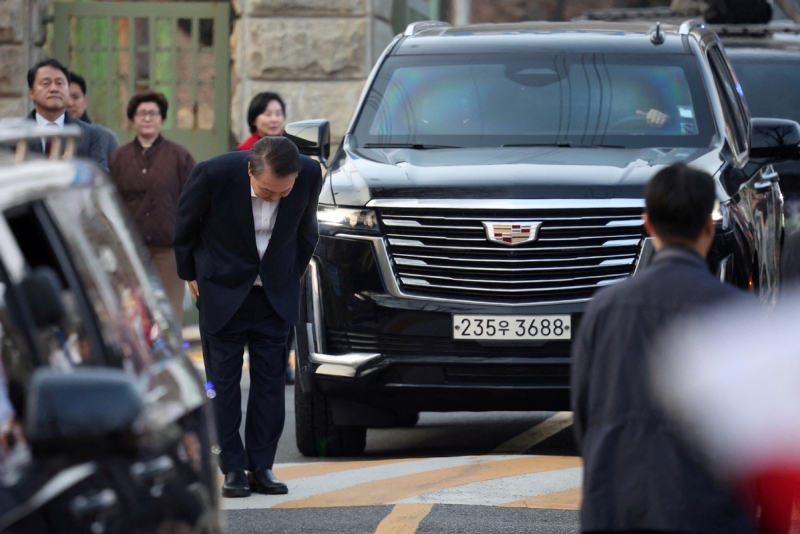
South Korean impeached President Yoon Suk-yeol bows outside the Seoul detention center after his release, in Uiwang, South Korea, March 8, 2025. [Photo/Agencies]
South Korea’s Constitutional Court has stirred nationwide anxiety by remaining silent on when it will deliver its much-anticipated impeachment ruling on President Yoon Suk-yeol, as observers warned that the delay risks magnifying the political crisis triggered by his December 3 declaration of martial law.
“With the president suspended from duty and uncertainty mounting, South Korea is suffering from growing economic losses and diplomatic paralysis,” Lee Jun-han, a political-science professor at Incheon National University, told This Week in Asia.
Yoon’s trial ended late last month and the judgment was widely expected to be announced by this week, driven by the court’s record of delivering verdicts on the country’s previous two presidential impeachment cases within two weeks of concluding hearings.
The court also typically notifies verdict dates two or three days ahead, indicating the decision will likely not be made until at least next week.
Yoon has justified his botched attempt to subvert civilian rule by claiming threats from “anti-state forces” that he claimed were aligned with North Korea and China.
Liberal opposition parties have voiced concerns that the court may be facing undue pressure from the ruling conservatives and Yoon’s far-right supporters emboldened by his release from detention earlier this month on technical grounds.
For months, South Korea has been rocked by pro- and anti-Yoon protests, exacerbating political divisions.
Lee Jae-myung, leader of the main opposition Democratic Party of Korea, called for a swift ruling, saying Yoon’s martial law decree had undermined the country’s democratic foundation.
“Only by restoring proper leadership can we overcome the current crisis,” he said on Wednesday.
“Now is the time for everyone to come together for the swift normalisation of South Korea.”
Lee, widely regarded as a leading presidential contender, also faces legal battles, including an appeal court ruling next week on allegations of election misconduct. If his guilty verdict is upheld by the Supreme Court, he could be barred from running for office for several years.
Meanwhile, acting president Choi Sang-mok has refused to appoint an additional justice recommended by the opposition to the Constitutional Court, a move critics argue is an attempt to influence the impeachment ruling.
If the court fails to reach a decision by April 18, when two of its eight justices are set to retire, the impeachment effort could collapse.
A two-thirds majority – six justices – is required to remove Yoon from office, meaning a single dissenting judge could block the effort.
Still, Yoon Sung-suk, a political-science professor at Chonnam National University, advised caution against over-reading the delay.
“If the court intended to reject the impeachment, it likely would have done so quickly,” he said. “The justices are being meticulous to ensure there are no legal loopholes, given the historic significance of this ruling.”
Lee from Incheon National University urged both supporters and opponents of Yoon to distance themselves from street protests and await the judgment patiently.
“If politics takes to the streets like this, it won’t help democracy,” he said. “For the Korean people, the best course of action is to exercise patience and allow the judiciary to do its job.”
However, Lim Ji-bong, a professor at Sogang University Law School, said “delayed justice is not justice”. “The Constitutional Court must deliver its verdict soon and allow the country to move forward.”
Lawmakers also impeached Prime Minister Han Duck-soo, who took over from Yoon, in December.
The Constitutional Court said on Thursday it will deliver a decision on Han’s case next Monday.
The opposition-controlled National Assembly plans to push through a special investigation into allegations of corruption involving first lady Kim Keon-hee after previous attempts were blocked by presidential vetoes.
The inquiry will look into claims that she was involved in stock manipulation, real estate speculation and the acceptance of luxury gifts.
Separately, the presidential office has denied reports that Kim reportedly rebuked security officials for failing to prevent investigators from executing a court-issued warrant to detain Yoon on January 15.
“What’s the point of carrying a gun? You’re supposed to stop something like that,” Yonhap News Agency quoted her as saying, citing police documents.
Kim also apparently said: “Honestly, I just want to shoot (Democratic Party leader) Lee Jae-myung and then take my own life.”
The presidential office called the report “groundless”.





